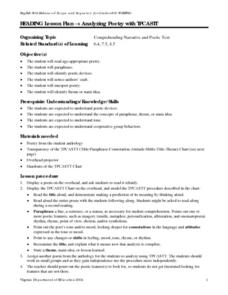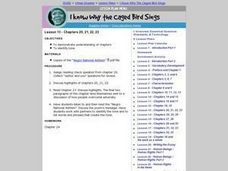One Stop English
A Lesson on Register
The classroom might not be the best place for informal language, but it's a great place to teach middle and high schoolers how to identify the correct language register for their audience. A short lesson on formal and informal language...
Academy of American Poets
Teach This Poem: "Violin" by Nikki Wallschlaeger
Nikki Wallschlaeger's Violin is the featured poem in a instructional activity that uses music and multiple readings to delve deep into its analysis. After a writing warm-up, learners watch and listen to a video that showcases Regina...
Curated OER
Lesson 2 Introduction Part 2
Ninth graders explore I Know Why the Caged Bird Sings. In this introductory lesson, 9th graders read Maya Angelou's poem "Still I Rise." Students write a journal telling what they believe is the message contained in the poem and discuss...
Curated OER
Philadelphia Museum of Art
Pupils study paintings and use their knowledge of story elements to analyze the art. In this art analysis lesson, students review a novel for its elements. Pupils study the image At the Moulin Rouge: The Dance and discuss the story...
Curated OER
Analyzing Poetry with TPCASTT
Middle schoolers read a poem and complete a TPCASTT chart. They make a prediction about the title (T) , paraphrase each line (P), identify poetic devices and nuances (C-connotation), explore mood and tone (A-attitude), point out shifts...
Curated OER
Style and Voice
Develop the writing skills of your high school class. Writers consider their personal style and voice, read selections by other authors, and then write pieces that challenge them to experiment with their own style.
Curated OER
The Sounds of Daydream
Based on the poem "The Lake Isle of Innisfree" by Irish poet William Butler Yeats, this resource is well constructed and guides learners through examining the Yeats poem (rhyme, meter, content) to composing a poem of their own about a...
Curated OER
Using Imagery To Introduce the Endocrine System
Students listen with closed eyes to a story that starts in a relaxed tone and ends in a scream. They list the body reactions they experience: fast heart rate, shaking, etc. and hypothesize the reason for the reactions. They explore the...
Curated OER
Narrative Nuts and Bolts
After viewing slides and reading about child labor, young authors compose an original narrative story. They practice note-taking skills and work to effectively engage a reader by incorporating plot, logical order, complex characters,...
Curated OER
Analyzing Speaker, Language, and Tone in the Writings of Benjamin Franklin
Students analyze writings by Benjamin Franklin. In this Benjamin Franklin lesson, students discover the pseudonyms under which Franklin used to write. Students compare and contrast 2 selections by Franklin.
Curated OER
Connotation and Denotation: How Word Choice Affects a Paragraph
Review the terms denotation, connotation, diction, and mood in paragraph writing. After defining the terms, middle schoolers practice writing examples of both connotation and denotation. They complete a connotation and denotation graphic...
Novelinks
The Little Prince: Concept/Vocab Analysis
Focus on the literary elements of Antoine de Saint-Exupéry's The Little Prince with a concept analysis sheet. With suggestions and explanations for many of the book's concepts, vocabulary, and other issues that may arise in instruction,...
Curated OER
Active and Passive Voice: Finding Examples Online
Incorporate technological fluency with a search for examples of active and passive voice in online resources. Discuss how use of active or passive voice influences mood or tone and contributes to author's purpose. List of...
Curated OER
Nomination Speech
Learners research and American author and nominate them for an award. They determine significant accomplishments of their author's career and life. They access the Biography Resource Center and research their author.
Curated OER
Text Elements—Vampires
Students explore the tone and style of passages from horror genre literature. For this literary elements lesson, students read The Vampire by John Stagg and the War of the World script by H.G. Wells, Students write about the way the...
Curated OER
Laurence Yep's Dragonwings
Students read independently the novel, "Dragonwings," by Laurence Yep and make connections between a text and the world. They summarize, paraphrase, analyze and evaluate skimming and scanning techniques when reading a novel. Each student...
Curated OER
Sleuthing a Writer's Skills
Students examine the author's lively text to determine how she achieved her many literary effects. They discover the author's techniques in describing people and events, in setting tone, and in establishing pace. They reflect about the...
Curated OER
American Rhythms
Students combine elements of music with poetry. In this creative writing lesson, students examine poems from a variety of authors with varying writing styles. Students explore the different elements of poetry, including tone, rhythm,...
Curated OER
Figure Analysis
Students identify the importance of the Principles and Elements of design through self-analysis and sketching clothing appropriate for their body type. They write the actual color name on a line of the included sheet, then describe why...
Roy Rosenzweig Center for History and New Media
War and Poetry
A band of brothers or the Devil's agents? Nobel warriors freeing the oppressed or mercenaries working for the military/industrial complex? Groups examine poems from the Civil War, World War I, and World War II to determine the poets'...
Arkansas Government
Creative Adventures with Literature - Whoever You Are
Celebrate our similarities and differences through multiple readings of Whoever you Are by Mem Fox. Readings are accompanied by a grand discussion, charts, creative art, dramatic, and music play to reinforce the uniqueness that is found...
Baylor College
The Variety and Roles of Microbes
Mini microbiologists play a card game in which they group microorganisms by groups: virus, fungus, protist, or bacteria. Then they identify the roles different microbes play in the natural world and explore how humans effectively use...
K20 LEARN
It’s Never Too Late to Apologize: Character Development and Theme in “The Scarlet Ibis”
Sometimes saying I'm sorry just doesn't cut it. Scholars examine a series of apology poems, songs, and stories and consider each speaker's regrets. Using what they have learned, they analyze James Hurst's short story, "The Scarlet Ibis,"...
Curated OER
I Know Why the Caged Bird Sings: Chapters 20, 21, 22, 23
Students complete chapter analysis activities for the Maya Angelou's I Know Why the Caged Bird Sings. In this novel analysis lesson, students read and discuss chapters 20, 21, and 22 from the novel. Students then read and listen to the...
Other popular searches
- Author's Tone and Mood
- Authors Tone and Mood
- Teaching Author's Tone
- Reading Authors Tone
- Analyzing Author's Tone
- Authors Tone and Voice
- Author's Tone and Style
- Understand the Author's Tone
- Authors Tone Powerpoint
- Writing Author's Tone

























